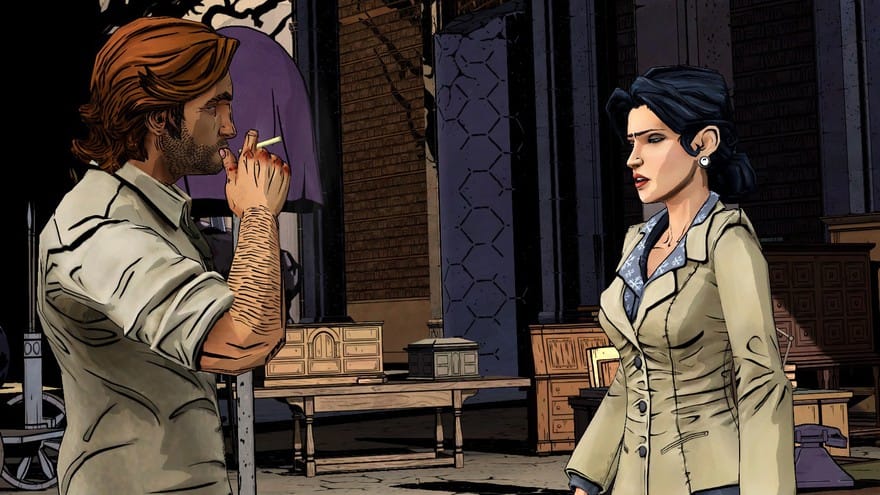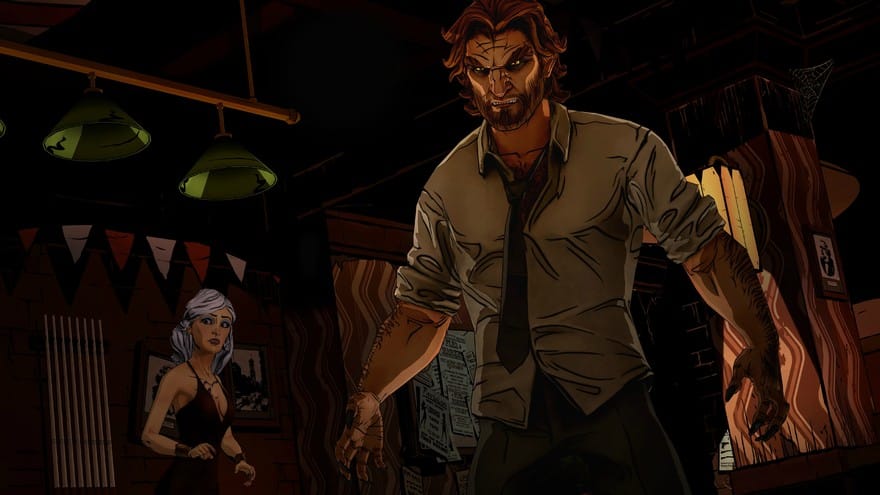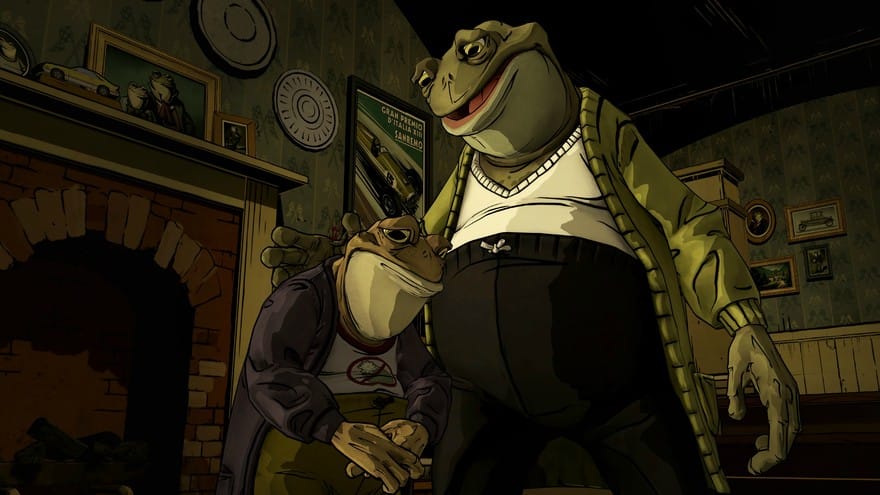A wolf in civil servant’s clothing

The office of Fabletown’s sheriff is small and cramped. A large green file cabinet sits in the back, and a bulletin board cluttered with scrawled notes hangs on his wall. A liquor bottle provides the centerpiece to his desk. His apartment, too, is of a meager size, albeit much emptier. Spartan furnishings keep decoration limited to functionality instead of aesthetics—liquor cabinet, table, ashtray, radio, talking pig roommate to provide counseling. For Bigby Wolf, the life of a sheriff offers little in terms of financial compensation and even less in the realm of appreciative clientele. No wonder he smokes so many damn cigarettes.
Telltale’s recently completed first season of The Wolf Among Us chronicles the moral trials and tribulations of Bigby Wolf as he investigates a local murder, but beneath a noir structure with a fairy tale twist lies a story about the stress and thanklessness of a civil servant’s job. Most games that involve the government do so on a fairly removed, conceptual level. Diplomacy in a game like Civilization stays in menus, trading goods and negotiating dealings with the figureheads of rival nations. The Total War series works similarly, as symbols and brief text boxes let the player know how the cities react to her governing decisions. Even the group dynamics found in Bioware’s Dragon Age and Mass Effect series attempt to blend the personal politics of building and maintaining a team of people with the large-scale diplomacy of worlds in peril. These games offer a necessarily broad approach to exploring how government workings can be reconstituted into game mechanics without bothering with personal stories.
Bigby Wolf, however, lacks the luxury of a removed perspective. When the head of a prostitute ends up on the stoop of the Woodland Luxury Hotel, the location of the city’s business and security offices and home to those who can afford the rent, Bigby takes a case where he confronts a bureaucracy as ugly as the murder he hopes to solve. His job as sheriff forces him to greet the pervasive distrust the denizens of Fabletown (referred to as “Fables”) have toward the local government and its officials. Their collective dearth of confidence in city hall and its employees forms one of Bigby’s largest obstacles in unraveling the truth, but the corrupt government dealings provide legitimate evidence for the citizens’ distrust. Negotiating this central tension turns the game into as much a civil servant simulator as it is a work of interactive detective fiction.

Like Jake Gittes in Chinatown, Bigby begins with a straightforward case that steadily reveals the complex machinations of a dangerous political cabal. Bluebeard greases palms to pass legislation that only benefits the wealthy. People unable to eke out a reasonable living fall into predatory dealings with the shadowy Crooked Man, who works tirelessly to keep his clients in crippling debt. Meanwhile, the government office, run by acting mayor Ichabod Crane and his deputy Snow White, enforces laws mandating glamour concealment while making the actual spells too expensive for most to afford. The Wolf Among Us throws so much government corruption in the player’s face that to recount it all would be overwhelming.
The central conflict in the game, however, comes from class disparity. Bigby’s quest for justice leads the player to confront the forgotten voices of Fabletown, those occupying slums and seedy tenements dismissed by the upper class. These citizens (most represented by fairytale villains and monsters) have all fallen through the cracks of Fabletown’s social strata, far from the eyes of City Hall. Here, Bigby encounters both the brutal realities of government impotence as well as the overwhelming difficulty encountered when trying to help uncooperative, distrusting people under systemic oppression.
Once such instance occurs when the case leads Bigby to the Trip Trap Bar. Owned by a troll named Holly, the Trip Trap plays host to those whom the system ignore. The patron Gren (Grendel of Beowulf infamy) quickly points out the rarity of government attention to their side of town:
“It’s about this fuckin’ lap dog. Only comes sniffing around this part of town when the rich fucks in the Woodlands need a shakedown…Holly’s sister goes missing and no one gives two shits about her. Paperwork, waiting rooms, and that bitch Snow White looking right past me, then ushering me out the fucking door.”
Gren’s disgust with the office’s bureaucratic dismissal of the lower class in favor of focusing only on those issues that inconvenience the upper class. It’s not a sentiment shared by many who live on the outside the Woodlands. Georgie Porgie gives Bigby a similar response when the sheriff comes around his strip club asking questions, and an investigation in the Jersey Devil’s pawn shop leads to a series of stonewalled responses.
When diplomacy fails, Bigby often abandons occupational professionalism to settle the dispute with his fists instead of paperwork. That Bigby resorts to violence is hardly a surprise. His fairytale villain past coupled with his hard-boiled Sam Spade- meets-Batman demeanor telegraph his outbursts far in advance. Fights with Gren, with Beast, interrogations of the Woodsman and of Georgie Porgie, and numerous other/alternative encounters before the final confrontation with the Crooked Man all offer scenarios where violence is a viable option. At times violence is inevitable, affording the player only enough agency to decide how to direct it or how brutal Bigby can be.

While most citizens see his temper as evidence of his true animal nature, Bigby, as well as the player, knows that the real source of his anger is job-related stress. The people fear Bigby’s strength and temper more than his office, and they have reason for doing so. His pent-up rage almost always explodes when the limits of official protocol become a source of frustration rather than a solution. Tearing apart some poor Fable’s house (or body) never helps the government’s image in the eyes of the public, making the player’s response an inherently political move, and politics, unfortunately, is often all these people see. On a return visit to the Trip Trap, Holly wonders aloud, “Do you even give a shit about us? The strays? The ones that aren’t in that fancy high rise. Those of us that gotta work for a living.” Bigby answers honestly, “You know, you make it hard sometimes.” She agrees, and he continues his investigation—all part of the job.
For the player, Bigby’s work is a look into an unfair but functional world. As much as the player pieces together clues, she cultivates relationships with and empathy for the people who suffer from systemic neglect. Fabletown’s government forces the downtrodden to suffer in silence. The Crooked Man capitalizes on this tacit endorsement and offers occupation in his illegal magic operations (Fabletown’s version of a drug trade) or his prostitution ring. Nerissa, a Fable under the Crooked Man’s employ, explains to Bigby, “People like us get forgotten all of the time. The Crooked Man was counting on that. When we suffer, we do it in silence, and the world likes it that way.” The Crooked Man, of course, is merely a symptom of a sick system, a bogeyman that gave Fabletown a face for evil.
It is fitting, then, that game’s climax takes the form of a town hall meeting and public trial that show how deeply the Crooked Man’s influence runs. The townsfolk evaluate both him and Bigby as the player’s choices are brought to the forefront. Opinions change and allegiances shift as all the evidence is gradually revealed and defenses are made in a microcosm of government machinery and community politics. The player sees the thanklessness of a government job reflected in an angry mob, some demanding blood and others speaking against the sheriff’s violent methods. Ultimately, the final judgment on the Crooked Man rests with the player because, for all their bickering, the public need someone to act.

The most brutal aspect of The Wolf Among Us appears after all the sturm und drang concerning the case, when the whole town goes back to business as usual. People return to their respective slums and high rises, Bluebeard still maneuvers dirty dealings to attain power, and the line out the door to the mayor’s office never seems to shrink. Outside the Woodland building, Bigby stands in the rain with Nerissa and reflects, “I just can’t win with these people.” She gives a vote of confidence, reassuring that despite appearances, he changed things and people noticed. Despite all that he’s seen, he cannot be sure if he made a definite impact in the larger story of Fabletown. Perhaps that’s all he can really hope to do: give a voice to people government has rendered voiceless and maybe cultivate some empathy for the people behind the desk who are doing the best they can in a job that has to be done.
That’s where The Wolf Among Us’ complexity lies. It challenges players to see government workings as complicated systems involving people deeply affected by decisions they never get to make, dragging the player along through a gauntlet of thanklessness and willful ignorance. People, after all, tend to have short, selective memories, and few care about the perspective of the guy behind the desk that does the job people hate him for doing. But they don’t really hate him so much as they hate the government that ignores the plight of the underclass in favor of maintaining wealth and privilege for a select few. At least The Wolf Among Us offers a glimpse into this world with hopefully enough bite to make us recognize such systemic problems when we come across them in our own lives.
In the meantime, we leave it to some unlucky bastard to put on his tie and shirt and ask the questions that people don’t want to answer. We let him look into corners of the world our bosses would rather we forget. We let a guy like Bigby figure out that the only way to solve a particular case is to confront the ugly realities of government failure and then berate him for not solving all the problems that arise from a broken system. And at the end of his work day, he goes home and hopes he made the slightest bit of difference. Then, he pours himself a drink and lights another goddamn cigarette.



